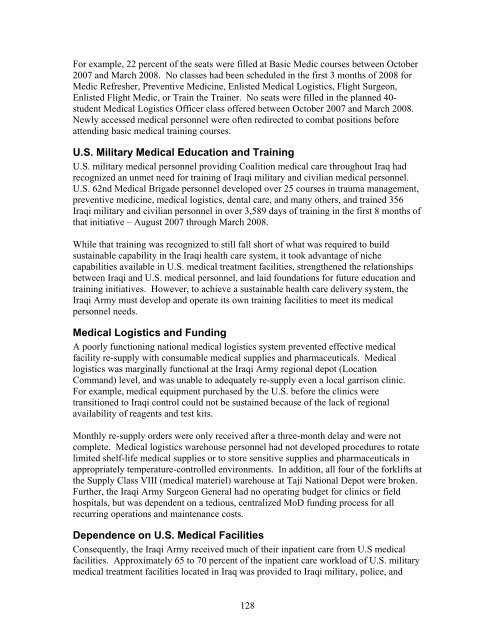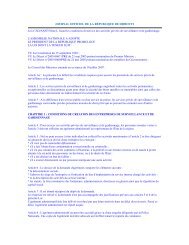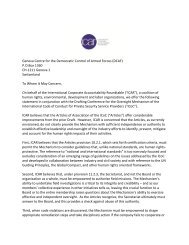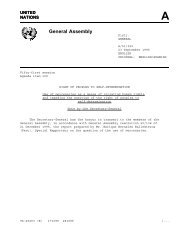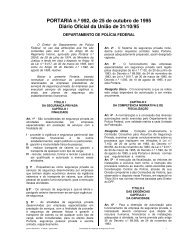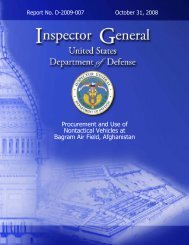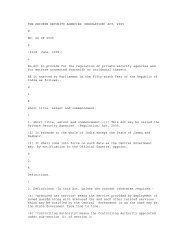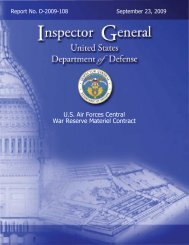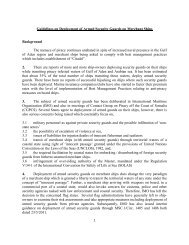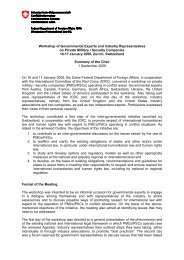Security Assistance; and Logistics - Federation of American Scientists
Security Assistance; and Logistics - Federation of American Scientists
Security Assistance; and Logistics - Federation of American Scientists
Create successful ePaper yourself
Turn your PDF publications into a flip-book with our unique Google optimized e-Paper software.
For example, 22 percent <strong>of</strong> the seats were filled at Basic Medic courses between October2007 <strong>and</strong> March 2008. No classes had been scheduled in the first 3 months <strong>of</strong> 2008 forMedic Refresher, Preventive Medicine, Enlisted Medical <strong>Logistics</strong>, Flight Surgeon,Enlisted Flight Medic, or Train the Trainer. No seats were filled in the planned 40-student Medical <strong>Logistics</strong> Officer class <strong>of</strong>fered between October 2007 <strong>and</strong> March 2008.Newly accessed medical personnel were <strong>of</strong>ten redirected to combat positions beforeattending basic medical training courses.U.S. Military Medical Education <strong>and</strong> TrainingU.S. military medical personnel providing Coalition medical care throughout Iraq hadrecognized an unmet need for training <strong>of</strong> Iraqi military <strong>and</strong> civilian medical personnel.U.S. 62nd Medical Brigade personnel developed over 25 courses in trauma management,preventive medicine, medical logistics, dental care, <strong>and</strong> many others, <strong>and</strong> trained 356Iraqi military <strong>and</strong> civilian personnel in over 3,589 days <strong>of</strong> training in the first 8 months <strong>of</strong>that initiative – August 2007 through March 2008.While that training was recognized to still fall short <strong>of</strong> what was required to buildsustainable capability in the Iraqi health care system, it took advantage <strong>of</strong> nichecapabilities available in U.S. medical treatment facilities, strengthened the relationshipsbetween Iraqi <strong>and</strong> U.S. medical personnel, <strong>and</strong> laid foundations for future education <strong>and</strong>training initiatives. However, to achieve a sustainable health care delivery system, theIraqi Army must develop <strong>and</strong> operate its own training facilities to meet its medicalpersonnel needs.Medical <strong>Logistics</strong> <strong>and</strong> FundingA poorly functioning national medical logistics system prevented effective medicalfacility re-supply with consumable medical supplies <strong>and</strong> pharmaceuticals. Medicallogistics was marginally functional at the Iraqi Army regional depot (LocationComm<strong>and</strong>) level, <strong>and</strong> was unable to adequately re-supply even a local garrison clinic.For example, medical equipment purchased by the U.S. before the clinics weretransitioned to Iraqi control could not be sustained because <strong>of</strong> the lack <strong>of</strong> regionalavailability <strong>of</strong> reagents <strong>and</strong> test kits.Monthly re-supply orders were only received after a three-month delay <strong>and</strong> were notcomplete. Medical logistics warehouse personnel had not developed procedures to rotatelimited shelf-life medical supplies or to store sensitive supplies <strong>and</strong> pharmaceuticals inappropriately temperature-controlled environments. In addition, all four <strong>of</strong> the forklifts atthe Supply Class VIII (medical materiel) warehouse at Taji National Depot were broken.Further, the Iraqi Army Surgeon General had no operating budget for clinics or fieldhospitals, but was dependent on a tedious, centralized MoD funding process for allrecurring operations <strong>and</strong> maintenance costs.Dependence on U.S. Medical FacilitiesConsequently, the Iraqi Army received much <strong>of</strong> their inpatient care from U.S medicalfacilities. Approximately 65 to 70 percent <strong>of</strong> the inpatient care workload <strong>of</strong> U.S. militarymedical treatment facilities located in Iraq was provided to Iraqi military, police, <strong>and</strong>128


